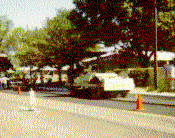U.S. Department of Transportation
Federal Highway Administration
1200 New Jersey Avenue, SE
Washington, DC 20590
202-366-4000
Focus
| Accelerating Infrastructure Innovations |
Publication Number: FHWA-SA-97-027
Date: September 1997
The Superpave system isn't just for State highway agencies. Local governments across the country are also beginning to see the advantages of switching to the Superpave system. One of the first was Albuquerque, New Mexico, where the Public Works Department and local industry are using the Superpave aggregate gradations and the Superpave binder specification to improve the performance of their asphalt pavements.
Albuquerque's decision to switch to the Superpave specifications grew out of frustration with the poor performance of the city's conventional asphalt mixes. "When I joined the city staff in 1988, one of my main tasks was to solve pressing problems with thermal cracking and with rutting and shoving in intersections," says Martin Barker, city pavement and materials engineer with the Albuquerque Public Works Department.
Barker's first step was to work with the city's asphalt and aggregate suppliers to implement quality control and quality assurance (QC/QA) procedures. They also revised the city's specifications for conventional asphalt mixes.
Meanwhile, Barker continued to follow new developments in asphalt mix design. The most promising, he decided, was the Superpave system then being developed under the Strategic Highway Research Program (SHRP). Barker learned more about the new mix design system from Bob Campbell of the Asphalt Institute.
In 1991, under Barker's leadership, Albuquerque revised its aggregate specifications to comply with the draft Superpave aggregate requirements. In 1993, the city began requiring that asphalt binders used in overlays and selected other projects must meet the draft Superpave binder specification. This year, Albuquerque began experimenting with the Superpave mix design procedures.
The city is now revising its specifications to stay in line with the evolution of the Superpave system and with the specifications of the New Mexico State Highway and Transportation Department, which is in the process of adopting the Superpave system. As a result of its favorable experience with the Superpave binder specification, the city is evaluating whether to require Superpave binders for all asphalt paving projects in Albuquerque.
The Superpave aggregate and binder specifications, combined with the QC/QA procedures, have resulted in asphalt mixes that are extremely durable, says Barker. Based on the improved performance to date, Barker predicts that overlays built with these durable mixes could last at least twice as long as those built with the city's traditional mixes. "With all the magic solutions that have been offered, this is the one that works," he says.
These benefits come at a price, but the city says it is money well spent. "Our Superpave mixes cost about 30 percent to 50 percent more than conventional Marshall mixes, but as far as we're concerned this front-end funding saves money on maintenance and life-cycle costs," Barker says. "Our position is that we have to have good roads, and we are willing to pay for them." Most of the increased cost is due to the modifier that must be added to the asphalt to make it meet the Superpave binder grade (PG76-28) called for by urban traffic conditions and by the city's extremely hot summers and cold winters.
Barker says having QC/QA procedures in place made it much easier to implement the Superpave specifications. Suppliers must certify that their products meet the Superpave specifications for aggregates and asphalt binders and that their operations meet applicable standards of the American Society for Testing and Materials and the American Association of State Highway and Transportation Officials. As a result, Albuquerque has not needed to purchase the costly Superpave binder test equipment.
Albuquerque shares information with its suppliers on how well their products comply to help them identify any problems. "The city has always been very forthcoming with this information," says Bill Alexander of Western Mobile, who worked with the city to change its specifications. "The information helps us track our performance." The city imposes monetary penalties when asphalt and aggregates fail to meet the specifications.
Since the QC/QA procedures were adopted, suppliers have dramatically improved their compliance with the city's specifications. This has given the Public Works Department confidence in suppliers' ability to meet the Superpave specifications and has made the transition to the new specifications much easier.
Implementing the Superpave materials specifications hasn't been without a few problems. "There was a learning curve for construction and compaction," says Barker. The binder Albuquerque specifies must be kept extremely hot at the asphalt plant, and the mix must be compacted before it cools too much.
As problems arise, Albuquerque will continue to work closely with industry to solve them. "If you have an agency in an adversarial relationship with suppliers, you have to fix it. With everyone working together, we've solved the problems that have come up in the past." Albuquerque will also work closely with housing developers as the city considers requiring that all new roads, including those in subdivisions, be built using an asphalt binder that meets the Superpave specifications.
For more information on Albuquerque's experiences, contact Martin Barker of the Albuquerque Public Works Department (phone: 505-243-0783; fax: 505-764-1587).
For more information on the Superpave system, contact John D'Angelo at FHWA (phone: 202-366-0121; fax: 202-366-7909; email: john.d'angelo@fhwa.dot.gov).

Albuquerque is using the Superpave aggregate gradations and the Superpave binder specifications to improve the performance of its asphalt pavements.